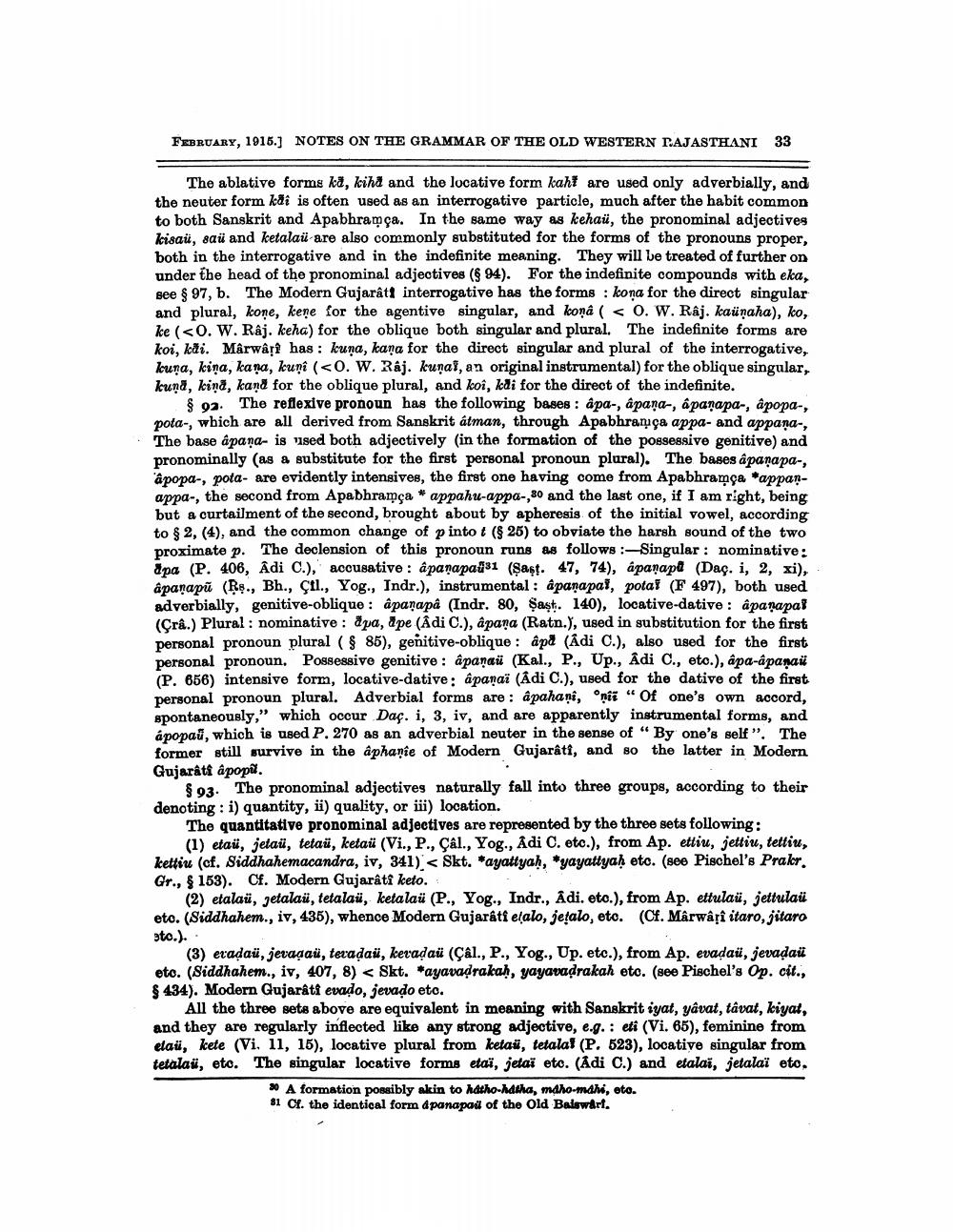________________
FEBRUARY, 1915.] NOTES ON THE GRAMMAR OF THE OLD WESTERN RAJASTHANI 33
The ablative forms kā, kiha and the locative form kaht are used only adverbially, and the neuter form kai is often used as an interrogative particle, much after the habit common to both Sanskrit and Apabhramça. In the same way as kehau, the pronominal adjectives kisau, sau and ketalai are also commonly substituted for the forms of the pronouns proper, both in the interrogative and in the indefinite meaning. They will be treated of further on under the head of the pronominal adjectives (§ 94). For the indefinite compounds with eka, see § 97, b. The Modern Gujarâtt interrogative has the forms: kona for the direct singular and plural, kone, kene for the agentive singular, and konâ (< O. W. Râj. kaüṇaha), ko, ke (<0. W. Raj. keha) for the oblique both singular and plural. The indefinite forms are koi, kai. Mârwârî has: kuna, kana for the direct singular and plural of the interrogative, kuna, kina, kana, kuni (<0. W. Raj. kunat, an original instrumental) for the oblique singular, kuna, kina, kand for the oblique plural, and koi, kai for the direct of the indefinite.
§ 92. The reflexive pronoun has the following bases: apa-, âpana-, apanapa-, âpopa-, pota-, which are all derived from Sanskrit átman, through Apabhrança appa- and appana-, The base âpana- is used both adjectively (in the formation of the possessive genitive) and pronominally (as a substitute for the first personal pronoun plural). The bases âpanapa-, apopa-, pota- are evidently intensives, the first one having come from Apabhramça *appanappa-, the second from Apabhramça * appahu-appa-,30 and the last one, if I am right, being but a curtailment of the second, brought about by apheresis of the initial vowel, according to § 2, (4), and the common change of p into t (§ 25) to obviate the harsh sound of the two proximate p. The declension of this pronoun runs as follows:-Singular: nominative: apa (P. 406, Adi C.), accusative: âpanapaus1 (Sast. 47, 74), apaṇapa (Daç. i, 2, xi), apaṇapu (Rs., Bh., Çil., Yog., Indr.), instrumental: apaṇapai, potal (F 497), both used adverbially, genitive-oblique: âpanapâ (Indr. 80, Sast. 140), locative-dative: âpanapat (Crâ.) Plural: nominative: apa, ape (Adi C.), âpana (Ratn.), used in substitution for the first personal pronoun plural (§ 85), genitive-oblique: âpă (Adi C.), also used for the first personal pronoun. Possessive genitive: âpanai (Kal., P., Up., Adi C., etc.), apa-apaṇai (P. 656) intensive form, locative-dative: âpanaï (Adi C.), used for the dative of the first personal pronoun plural. Adverbial forms are: âpahani, ni "Of one's own accord, spontaneously," which occur Daç. i, 3, iv, and are apparently instrumental forms, and ápopau, which is used P. 270 as an adverbial neuter in the sense of " By one's self". The former still survive in the âphanie of Modern Gujarati, and so the latter in Modern Gujarati âpopul.
§ 93. The pronominal adjectives naturally fall into three groups, according to their denoting: i) quantity, ii) quality, or iii) location.
The quantitative pronominal adjectives are represented by the three sets following:
(1) etaü, jeta, tetaü, ketaü (Vi., P., Çâl., Yog., Adi C. etc.), from Ap. ettiu, jettiu, tettiu, kettiu (cf. Siddhahemacandra, iv, 341) Skt. *ayattyah, *yayattyaḥ etc. (see Pischel's Prakr. Gr., § 153). Cf. Modern Gujarâtî keto.
(2) etala, jetala, tetalai, ketalaü (P., Yog., Indr., Adi. etc.), from Ap. ettulaü, jettulaü etc. (Siddhahem., iv, 435), whence Modern Gujarati etalo, jetalo, etc. (Cf. Mârwârî itaro, jitaro etc.).
(3) evaḍaü, jevaḍau, teraḍaü, kevaḍaü (Çâl., P., Yog., Up. etc.), from Ap. evaḍaü, jevaḍaü etc. (Siddhahem., iv, 407, 8) < Skt. *ayavaḍrakaḥ, yayavaḍrakah etc. (see Pischel's Op. cit., § 434). Modern Gujarati evado, jevaḍo etc.
All the three sets above are equivalent in meaning with Sanskrit iyat, yâvat, tâvat, kiyat, and they are regularly inflected like any strong adjective, e.g.: eti (Vi. 65), feminine from etaü, kete (Vi. 11, 15), locative plural from ketau, tetala! (P. 523), locative singular from tetalai, etc. The singular locative forms etaï, jetaï etc. (Adi C.) and etalai, jetalaï etc.
30 A formation possibly akin to hatho-hatha, maho-madhi, eto. 81 Cf. the identical form apanapaul of the Old Baiswari.




